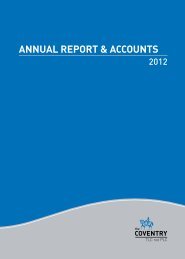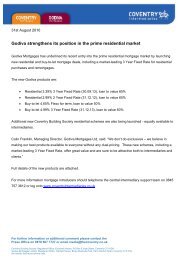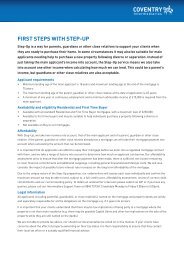Annual report and accounts 2009 (PDF) - Coventry Building Society
Annual report and accounts 2009 (PDF) - Coventry Building Society
Annual report and accounts 2009 (PDF) - Coventry Building Society
Create successful ePaper yourself
Turn your PDF publications into a flip-book with our unique Google optimized e-Paper software.
DIRECTORS’ REMUNERATION REPORTINTRODUCTIONThis <strong>report</strong> informs members of the <strong>Society</strong> of the policy forthe remuneration of directors, executive <strong>and</strong> non-executive,who are equally responsible in law for directing the <strong>Society</strong>’saffairs.POLICY FOR EXECUTIVE DIRECTORSExecutive directors are employed by the <strong>Society</strong> <strong>and</strong> arerequired to devote substantially the whole of their time to itsaffairs. The policy of the board is to recruit <strong>and</strong> retain highcalibre executive directors <strong>and</strong> to ensure that theirremuneration packages (consisting of basic salary,performance related bonuses, pension arrangements <strong>and</strong>other benefits) reflect their responsibilities, performance <strong>and</strong>experience. The level of remuneration for the executivedirectors is set by the Remuneration Committee. TheCommittee consists of the non-executive directors only <strong>and</strong> ischaired by Bridget Blow, the <strong>Society</strong>’s Deputy Chairman <strong>and</strong>Senior Independent Director.The principal elements of the executive directors’remuneration packages are as follows:a) Basic salaryThe <strong>Society</strong>’s reward strategy for executive directors aimsto pay competitive market salaries <strong>and</strong> to recogniseindividual development <strong>and</strong> progression through theannual salary <strong>and</strong> personal review processes.Salaries are reviewed annually, taking into accountcomparative data from other building societies. The latestreview of remuneration policy found that base salaries forthe executive directors remain below median levels relativeto other societies of a comparable size.b) <strong>Annual</strong> performance related bonusAll eligible <strong>Coventry</strong> <strong>Building</strong> <strong>Society</strong> staff participate in anannual performance related bonus scheme. Eligibility isdependent upon satisfactory individual performance. Theexecutive directors participated in this scheme in <strong>2009</strong>.The performance of the <strong>Society</strong> during <strong>2009</strong> gave rise to acalculated bonus for all 1,350 eligible members of staffequivalent to 8% of basic salary. The bonus percentagepayable to each of the executive directors of 8% of basicsalary was identical to that of all other eligible staff.In view of the continuing difficult economic environment<strong>and</strong> its impact on members, David Stewart elected towaive all bonus payments for <strong>2009</strong>.c) Long Term Incentive PlanIn order to ensure that the remuneration package ofexecutive directors reflects the long term performance ofthe <strong>Society</strong> <strong>and</strong> members’ interests, the RemunerationCommittee operates a Long Term Incentive Plan (LTIP) forexecutive directors.The primary objective of this plan is to align remunerationwith the longer term goals of the <strong>Society</strong>. The LTIP alsohelps the <strong>Society</strong> to recruit <strong>and</strong> retain executives of thecalibre required to promote the interests of members.Under the LTIP, the executive directors are eligible toreceive a performance related payment based on thefinancial performance of the <strong>Society</strong> over rolling three yearperiods. The first period over which performance wasmeasured ended 31 December <strong>2009</strong>. A second periodends 31 December 2010.The plan is designed to make payments in the early part ofthe year following the end of the three year periodproviding that consistent <strong>and</strong> strong performance isachieved against the current three year plan. An on-planperformance over each of the three year periods wouldprovide a 20% of salary cash payment, with a maximum of40% (which is below the 50% of salary maximumpermitted under the <strong>Society</strong>’s Rules) for consistent overperformanceover the three year period. Performancemeasures have been designed to balance the objective ofsustained profit growth with the need for the <strong>Society</strong> toprovide competitive lending <strong>and</strong> savings rates to members.In addition, to protect the interests of members, theCommittee may amend any payment if it considers itappropriate in light of either the <strong>Society</strong>’s overallperformance or economic conditions. In assessing this,the Committee will take account of a range of factors suchas customer <strong>and</strong> member satisfaction, the impact of ‘oneoff’exceptional items, the performance of competitors,<strong>and</strong> the <strong>Society</strong>’s health <strong>and</strong> safety record.Notwithst<strong>and</strong>ing the very strong performance of the<strong>Society</strong>, in view of the impact of the ‘credit crunch’ on the<strong>Society</strong>’s members, the Committee determined that nopayment was made for the period 2007-<strong>2009</strong>.Any payments under the LTIP are subject to approval bythe Remuneration Committee <strong>and</strong> are not pensionable. Itis expected that further plans will be put in place givingpotential payments in years subsequent to 2011.As with base salaries, bonus payments are alsobenchmarked on a regular basis. Bonuses earned byexecutive directors are significantly below median levelsrelative to the comparison group of building societies.25
















